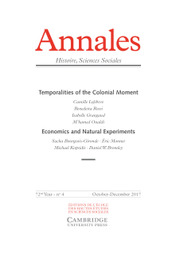Article contents
A New Battle for History in the Twenty-First Century?
Published online by Cambridge University Press: 04 April 2017
Abstract
This article engages with some of the questions raised by David Armitage and Jo Guldi’s “The Return of the longue durée: An Anglo-American Perspective” and their resonance among readers of the Annales. In particular, it challenges the authors’ classification of a variety of different historical studies of short periods of time under the rubric of “microhistory.” It also questions their argument that such studies are evidence of a “moral crisis” that supposedly dominated anglophone historiography from the cultural revolution of 1968 to the global financial crisis of 2008. Furthermore, the article contrasts the less conventional meanings that Fernand Braudel originally attributed to the longue durée with the ways that Armitage and Guldi interpret this expression. Finally, it asks how, in practice, historians are supposed to follow the authors’ invitation to move beyond specialized training and knowledge to produce sweeping new and original interpretations of millennia of human history.
- Type
- Debating the Longue Durée
- Information
- Annales. Histoire, Sciences Sociales - English Edition , Volume 70 , Issue 2 , June 2015 , pp. 261 - 270
- Copyright
- Copyright © Les Éditions de l’EHESS 2015
References
1. Armitage, David and Guldi, Jo, “The Return of the Longue Durée: An Anglo-American Perspective,” Annales HSS (English version) 70, no. 2 (2015): 219–47, here p. 222CrossRefGoogle Scholar.
2. Ibid., 238.
3. Ibid., 221 and 238.
4. Ibid., 228.
5. Ibid., 235.
6. Reinhart, Carmen M. and Rogoff, Kenneth S., This Time is Different: Eight Centuries of Financial Folly (Princeton: Princeton University Press, 2010)Google Scholar; Acemoglu, Daron and Robinson, James A., Why Nations Fail: The Origins of Power, Prosperity and Poverty (New York: Crown Publishers, 2012)Google Scholar; Piketty, Thomas, Capital in the Twenty-First Century, trans. Goldhammer, Arthur (Cambridge: Belknap Press of Harvard University Press, 2014)CrossRefGoogle ScholarPubMed. Interestingly, Piketty argues that it is the lower prestige that academic economists enjoy in France, both within academia and among political and financial circles, that stimulates their interdisciplinarity and their empirical research (p. 32). By his estimation, “In France ... economists are slightly more interested in persuading historians and sociologists, as well as people outside the academic world, that what they are doing is interesting (although they are not always successful).”
7. Krugman, Paul, “The Fall and Rise of Development Economics,” in Rethinking the Development Experience: Essays Provoked by the Works of Albert O. Hirschman, ed. Rodwin, Lloyd and Schön, Donald A. (Washington/Cambridge: The Brookings Institution/ Lincoln Institute of Land Policy, 1994), 39–58, here p. 40Google Scholar.
8. Paxton, Robert O., Vichy France: Old Guard and New Order, 1940–1944 (New York: Knopf, 1972)Google Scholar; Morris, Benny, The Birth of the Palestinian Refugee Problem, 1947–1949 (Cambridge: Cambridge University Press, 1987)Google Scholar; Gross, Jan T., Neighbors: The Destruction of the Jewish Community in Jedwabne, Poland (Princeton: Princeton University Press, 2001)CrossRefGoogle Scholar; Gross, , Fear: Anti-Semitism in Poland after Auschwitz: An Essay in Historical Interpretation (New York: Random House, 2006)Google Scholar.
9. See, for example, Landes, David S., The Wealth and Poverty of Nations: Why Some Are So Rich and Some So Poor (New York: W. W. Norton, 1998)Google Scholar; Huntington, Samuel P., The Clash of Civilizations and the Remaking of World Order (New York: Simon & Schuster, 1997)Google Scholar; Lewis, Bernard, The Crisis of Islam: Holy War and Unholy Terror (New York: Modern Library, 2003)Google Scholar.
10. Herlihy, David and Klapisch-Zuber, Christiane, Les Toscans et leurs familles. Une étude du catasto florentin de 1427 (Paris: Presses de la FNSP/EHESS, 1978)Google Scholar; abridged English edition: Tuscans and their Families: A Study of the Florentine Catasto of 1427 (New Haven: Yale University Press, 1985).
11. Among many notable examples, see Baxandall, Michael, Painting and Experience in Fifteenth-Century Italy: A Primer in the Social History of Pictorial Style (Oxford: Clarendon Press, 1972)Google Scholar; Goody, Jack, Renaissances: The One or the Many? (Cambridge: Cambridge University Press, 2010)Google Scholar.
12. Armitage and Guldi, “The Return of the Longue Durée,” 220.
13. Bailyn, Bernard, “Braudel’s Geohistory: A Reconsideration,” Journal of Economic History 11, no. 3. (1951): 277–82 CrossRefGoogle Scholar, here p. 279.
14. Braudel, Fernand, “History and the Social Sciences: The Longue Durée,” in On History, trans. Matthews, Sarah (Chicago: University of Chicago Press, 1982), 25–54, here p. 29 Google Scholar. Originally published as “Histoire et sciences sociales. La longue durée,” Annales ESC 13, no. 4 (1958): 725–53 Google Scholar.
15. Ibid., 31.
16. Ibid., 33–34.
17. Ibid, 25.
- 1
- Cited by
Linked content
This is a translation of: Un nouveau combat pour l'histoire au XXIe siècle ?


